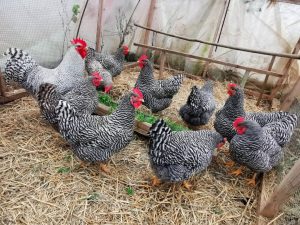Characteristics
- Appearance: Plymouth Rocks have a distinctive appearance with their black and white barred plumage, giving them a striped look. They have a single comb, red wattles, and earlobes.
- Size: They are a medium to large breed. Roosters typically weigh about 7.5 to 9.5 pounds, while hens weigh around 6.5 to 7.5 pounds.
- Temperament: Known for their friendly and calm demeanor, Plymouth Rocks are good with children and make excellent pets. They are also good foragers and do well in both confined and free-range conditions.
Uses
- Egg Production: Plymouth Rock hens are good layers, producing around 200-280 large brown eggs per year. Their consistent egg-laying ability makes them a popular choice for backyard flocks.
- Meat: They are also valued for their meat quality. Their size and growth rate make them a good option for those looking to raise chickens for both eggs and meat.
Care and Management
- Space Requirements: Plymouth Rocks need sufficient space to move around, particularly if they are confined. They thrive in environments where they can forage and explore.
- Feed: A balanced diet that includes a good quality layer feed, along with access to greens and insects while foraging, is essential for their health and productivity.
- Health: Plymouth Rocks are generally hardy and disease-resistant birds. Regular health checks, clean living conditions, and proper nutrition will help maintain their health.
Notable Traits
- Dual-Purpose: Their ability to provide both high-quality meat and a good number of eggs makes them a versatile choice for small farms and backyard flocks.
- Hardiness: Plymouth Rocks are known for their hardiness and adaptability to different climates, making them a reliable breed in various conditions.
- Friendly Nature: Their calm and friendly nature makes them easy to handle and a favorite among families and hobbyists.
Plymouth Rocks are an excellent choice for those looking for a reliable, dual-purpose chicken breed that is easy to care for and has a friendly disposition. Their striking appearance and productive capabilities make them a valuable addition to any flock.
